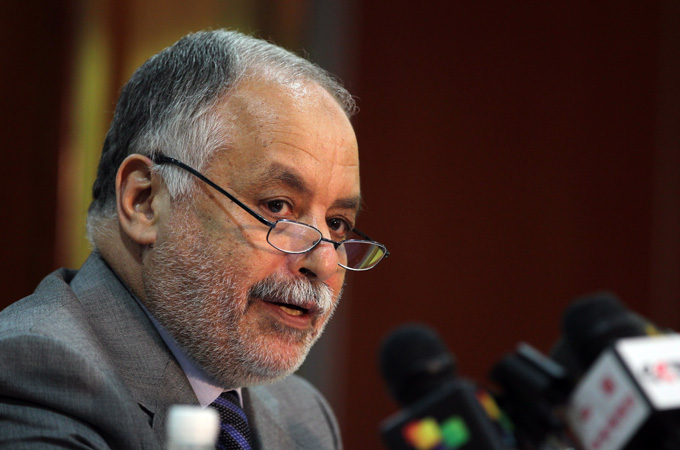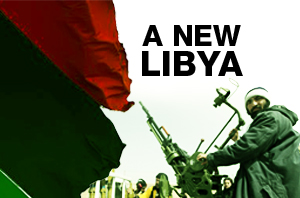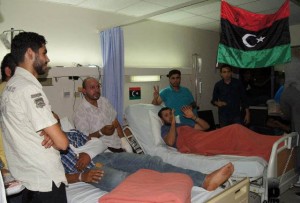http://www.aljazeera.com/news/africa/2012/06/2012624135853340329.html
http://www.libyaherald.com/jordanians-face-bankruptcy-over-unpaid-libyan-bills/
Last Friday, Libya's Attorney General, Mr. Abdelaziz Al-Hassadi, heading a high level Libyan delegation to the International Criminal Court (ICC) in The Hague where he met with the ICC President, Judge Sang-Hyun Song, the ICC Registrar Silvana Arbia, and other ICC officials to discuss the situation of the four ICC staff members held in Zintan.
During the meeting, Mr. Al-Hassadi presented to the ICC officials information regarding the visit by the four ICC staff members to Zintan on June 7.
The ICC President thanked Mr Al-Hasadi and expressed appreciation for the mutual trust confirmed in the meetings. He welcomed the commitment of the Libyan authorities to cooperate fully with the ICC in accordance with United Nations Security Council resolution 1970 (2011).
During the meeting Mr Song underlined the shared interest of the ICC and the Libyan authorities that Seif Al-Islam Gaddafi and Abdullah Al-Senussi should face justice.
The ICC said it takes very seriously the information reported by Libyan authorities in relation to the ICC staff members’ visit, and fully understands the importance of the matter for the Libyan authorities and the people of Libya.
The Court said it attaches great importance to the principle that when carrying out their functions, its staff members, should also respect national laws. It added that the information reported by the Libyan authorities would be fully investigated in accordance with ICC procedures following the return of the four staff members.
For this purpose, the Court would be seeking further background information from the Libyan authorities, as such, it will remain in close contact with the Libyan authorities to inform them of progress.
The ICC said in its statement, it deeply regrets any events that may have given rise to concerns on the part of the Libyan authorities, and that in carrying out its functions, the Court has no intention of doing anything that would undermine the national security of Libya.
When the ICC has completed its investigation, the Court will ensure that anyone found responsible for any misconduct will be subject to appropriate sanctions, it added in the statement.The ICC said that in fulfilling its mandate to end impunity and providing justice to victims, it is ready to assist national authorities with their investigations if requests are submitted to the Court. The ICC is committed to continued mutual cooperation with the Libyan authorities and will do everything it can to assist them, it said.
Rounding up, the ICC said in its statement, that it is extremely grateful to the Libyan authorities for their commitment to take all necessary action for the release of the Court’s staff members and their speedy reunification with their family members.
Melinda Taylor, an Australian citizen, who, Libyan officials say is Seif's court-appointed defence counsel, was arrested two weeks ago when, while trying to visit Seif, she had tried to smuggle him letters from his fugitive right-hand man Mohammed Ismail, a former intelligence officer with Gaddafi regime and the right-hand man to Seif who is now on the run.
The ICC indicted Seif al-Islam last June for war crimes allegedly committed during the conflict that led to the ousting of his father Muammar, following over for decades of dictatorial rule.
Libya said it will try Seif al-Islam, and has refused to extradite him to The Hague.
and......
http://www.tripolipost.com/articledetail.asp?c=1&i=8630
There have also been unverified reports saying that Mr al-Jazwi had issued the warrant for Gen Younes's questioning.
Judge al-Jazwi was also a "primary suspect" in the death of Mr Younes, a spokesman for Benghazi's local council told news agency AFP.
| Tunisia extradites Gaddafi-era PM to Libya | |||
Decision to send back Al Baghdadi Ali al-Mahmoudi leads to row between Tunisian PM and president.
Last Modified: 24 Jun 2012 17:18
| |||

Mahmoudi is being held in a prison under the supervision of the Libyan justice ministry, officials say [EPA]
| |||
| Al Baghdadi Ali al-Mahmoudi, who served as prime minister of Libya under Muammar Gaddafi, has been placed in prison after Tunisia extradited him, Libyan officials say. A Libyan defence ministry official, Mohammed al-Ahwal, said that a helicopter transferred Mahmoudi to the capital Tripoli.
"As a result of the intense diplomatic efforts undertaken by the Libyan interim government ... the Libyan government has received today Al-Baghdadi Ali Al-Mahmudi," Abdel Rahim al-Kib, prime minister of Libya's interim government, said on Sunday.
Kib said Mahmoudi was being held in a prison under supervision of the ministry of justice and the judiciary police. Earlier on Sunday, Ridha Kazdaghli, a spokesman for Tunisia's prime minister, Hamadi Jebali, confirmed Mahmoudi's transfer to Tripoli. Dispute in Tunisia The extradition decision touched off a row between the Tunisian president's and Jebali's offices. "President Moncef Marzouki did not sign any decree. This decision will have repercussions for the relationship between the presidency and the government," Adnen Manser, a presidential adviser, said, giving warning of a "serious crisis". Marzouki was in southern Tunisia on Sunday for commemorations to mark the 70th anniversary of the foundation of the national army.
Two Tunisian court decisions backed Libya's request to extradite him, but Marzouki had said in May he was opposed to the transfer unless Libya could guarantee it would respect Mahmoudi's rights and give him a fair trial. The extradition could establish a precedent for other countries who have given refuge to or arrested members of Gaddafi's old entourage. Libya's government and the International Criminal Court, which indicted Gaddafi's son Saif al-Islam in June for crimes against humanity stemming from the crackdown on last year's revolt, have argued for months over where he should be tried. Libya considers it a matter of national pride and a measure of the country's transformation for Saif al-Islam's and other Gaddafi loyalists trials to be held in Libya.
and....
|
http://www.libyaherald.com/jordanians-face-bankruptcy-over-unpaid-libyan-bills/
Jordanians face bankruptcy over unpaid Libyan bills
By Nihal Zaroug.
Tripoli 24 June:
Outstanding medical and hotel bills incurred by Libyans who sought treatment in debt stricken Jordan, continue to cause problems for the many private hospitals and hotels, threatening some with bankruptcy and closure according to local reports.
The World Bank had ranked Jordan as the top medical destination in the MENA region and fifth in the world. Tourism and medical travel are major contributors to the country’s economy. Sluggish growth in 2011 is attributed to a 18 percent drop in tourist arrivals. The number of Syrians who accounted for one-third of all tourists fell by 23 percent last year.
Libya’s delay in paying bills is exacerbating an already difficult situation and with the beginning of summer, Jordan expects some tourists, even if their numbers are small, and they still need accommodation.
As of last month the outstanding amount owed to hotels was $127 million according to the Jordan Hotel Association (JHA). Some $85 million was due to the private hospitals, according to Jordan’s Private Hospitals Association (PHA). Promises to pay bills have been given several times by the Libyan government but the auditing of bills is necessary to ensure authenticity and to uncover any possible fraud.
Medical treatment in Jordan was intended for the wounded fighters and civilians injured during the revolution. However mismanagement of the initiative, which was suspended in February, turned it into a free-for-all, boosting the number who travelled to Jordan to 50,000. Many patients took husbands, wives and children, causing the Libyan government to pay for treatment, travel and accommodation for both patients and their relatives. This is the sort of fraud that the government is hoping to uncover by auditing the assembled bills.
Both the JHA and PHA have been the leading movers trying to secure bills payments. They have warned several times that services provided to Libyan’s would be suspended if bills remained unpaid. Reportedly some hotels have evicted Libyans. Meanwhile both Libyans and hotel owners have protested at the Libyan embassy in Amman, over the failure to pay outstanding bills.
Last month, the Libyan Central Medical Committee and Jordan’s Royal Medical Services (RMS) signed an accord to provide treatment for Libyan patients and training for medical staff at the RMS hospitals. In spite of the discouraging delay in bills settlement, the signing of the agreement signals a wish for both countries to continue cooperating. It also signals a move away from providing treatment at private hospitals, as the RMS hospitals are attached to the Jordanian Armed Forces.
and...
http://www.tripolipost.com/articledetail.asp?c=1&i=8643
| ICC Promises to Investigate Wrongdoing of its Staff in Libya 24/06/2012 10:34:00 | ||
| The International Criminal Court, ICC, has expressed regret to Libyan authorities and has promised to investigate allegations of wrongdoing by its staff in Libya, and the allegations against Ms Melinda Taylor and her staff who went to Zintan earlier this month to meet Seif al-Islam Gaddafi, the son of the late Libyan leader. According the Libyan Prime Minister, Abdurrahim el-Keeb, by her actions, Ms Taylor had compromised national security and should be investigated. She was accused of attempting to pass on sensitive documents to Seif, who is subject to prosecution before the ICC for alleged crimes against humanity, documents from a former Gaddafi ally and was then detained. . Libyan officials said last week they may consider releasing ICC lawyer Melinda Taylor and three of her colleagues if the court apologised over the allegations. The ICC's latest position seems to come close to an apology designed to secure the release of four ICC employees detained in the country. In a statement issued after a meeting at the court's headquarters in The Hague between Abdelaziz Al-Hassadi, the Libyan attorney general, and Sang-Hyun Song, the court's president, the ICC said it deeply regretted any events that may have given rise to concerns on the part of the Libyan authorities "The Court will ensure that anyone found responsible for any misconduct will be subject to appropriate sanctions," the statement continued. |
During the meeting, Mr. Al-Hassadi presented to the ICC officials information regarding the visit by the four ICC staff members to Zintan on June 7.
The ICC President thanked Mr Al-Hasadi and expressed appreciation for the mutual trust confirmed in the meetings. He welcomed the commitment of the Libyan authorities to cooperate fully with the ICC in accordance with United Nations Security Council resolution 1970 (2011).
During the meeting Mr Song underlined the shared interest of the ICC and the Libyan authorities that Seif Al-Islam Gaddafi and Abdullah Al-Senussi should face justice.
The ICC said it takes very seriously the information reported by Libyan authorities in relation to the ICC staff members’ visit, and fully understands the importance of the matter for the Libyan authorities and the people of Libya.
The Court said it attaches great importance to the principle that when carrying out their functions, its staff members, should also respect national laws. It added that the information reported by the Libyan authorities would be fully investigated in accordance with ICC procedures following the return of the four staff members.
For this purpose, the Court would be seeking further background information from the Libyan authorities, as such, it will remain in close contact with the Libyan authorities to inform them of progress.
The ICC said in its statement, it deeply regrets any events that may have given rise to concerns on the part of the Libyan authorities, and that in carrying out its functions, the Court has no intention of doing anything that would undermine the national security of Libya.
When the ICC has completed its investigation, the Court will ensure that anyone found responsible for any misconduct will be subject to appropriate sanctions, it added in the statement.The ICC said that in fulfilling its mandate to end impunity and providing justice to victims, it is ready to assist national authorities with their investigations if requests are submitted to the Court. The ICC is committed to continued mutual cooperation with the Libyan authorities and will do everything it can to assist them, it said.
Rounding up, the ICC said in its statement, that it is extremely grateful to the Libyan authorities for their commitment to take all necessary action for the release of the Court’s staff members and their speedy reunification with their family members.
Melinda Taylor, an Australian citizen, who, Libyan officials say is Seif's court-appointed defence counsel, was arrested two weeks ago when, while trying to visit Seif, she had tried to smuggle him letters from his fugitive right-hand man Mohammed Ismail, a former intelligence officer with Gaddafi regime and the right-hand man to Seif who is now on the run.
The ICC indicted Seif al-Islam last June for war crimes allegedly committed during the conflict that led to the ousting of his father Muammar, following over for decades of dictatorial rule.
Libya said it will try Seif al-Islam, and has refused to extradite him to The Hague.
and......
http://www.tripolipost.com/articledetail.asp?c=1&i=8630
| Libyan Rights Group Says NTC is Responsible for Killing of Prominent Judge 22/06/2012 20:00:00 | ||||||||
| ||||||||
| judge Jumah Hasan al-Jazwi The Libyan Observatory for Human Rights said the National Transitional Council, NTC, was responsible for the killing of judge Jumah Hasan al-Jazwi in Benghazi. Al-Jazwi was investigating last year's murder of a defected long-time aide to the dead dictator Muammar Gaddafi. Mr. al-Jazwi was shot dead on Thursday, on his way to a mosque. He was investigating last year's murder of Gen Abdel Fattah Younes. In a statement the Observatory said that the National Transitional Council, which is administering Libya's transitional governance, was deliberately delaying uncovering the circumstances around Gen Younes's killing, BBC reported on Friday. Younes was killed after he was issued a warrant for questioning and recalled to Benghazi from the front line in the city of Brega. Varying accounts of how he was killed were then given by officials at the time, including to NTC leader Mustafa Abdul-Jalil. | ||||||||
There have also been unverified reports saying that Mr al-Jazwi had issued the warrant for Gen Younes's questioning.
Judge al-Jazwi was also a "primary suspect" in the death of Mr Younes, a spokesman for Benghazi's local council told news agency AFP.







No comments:
Post a Comment